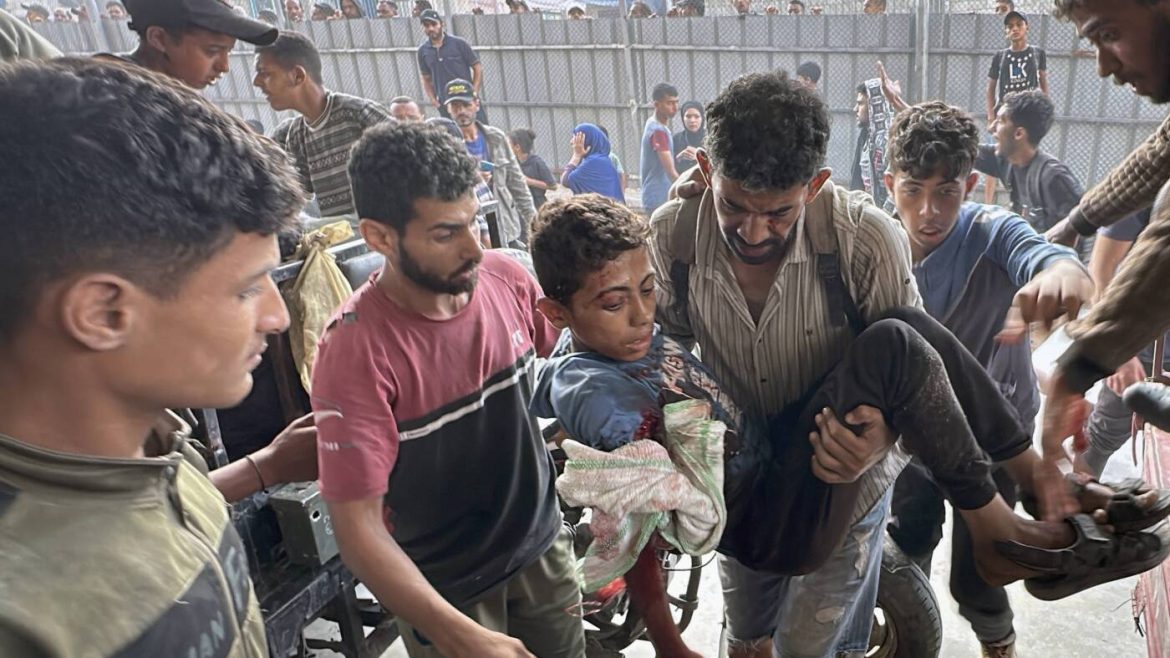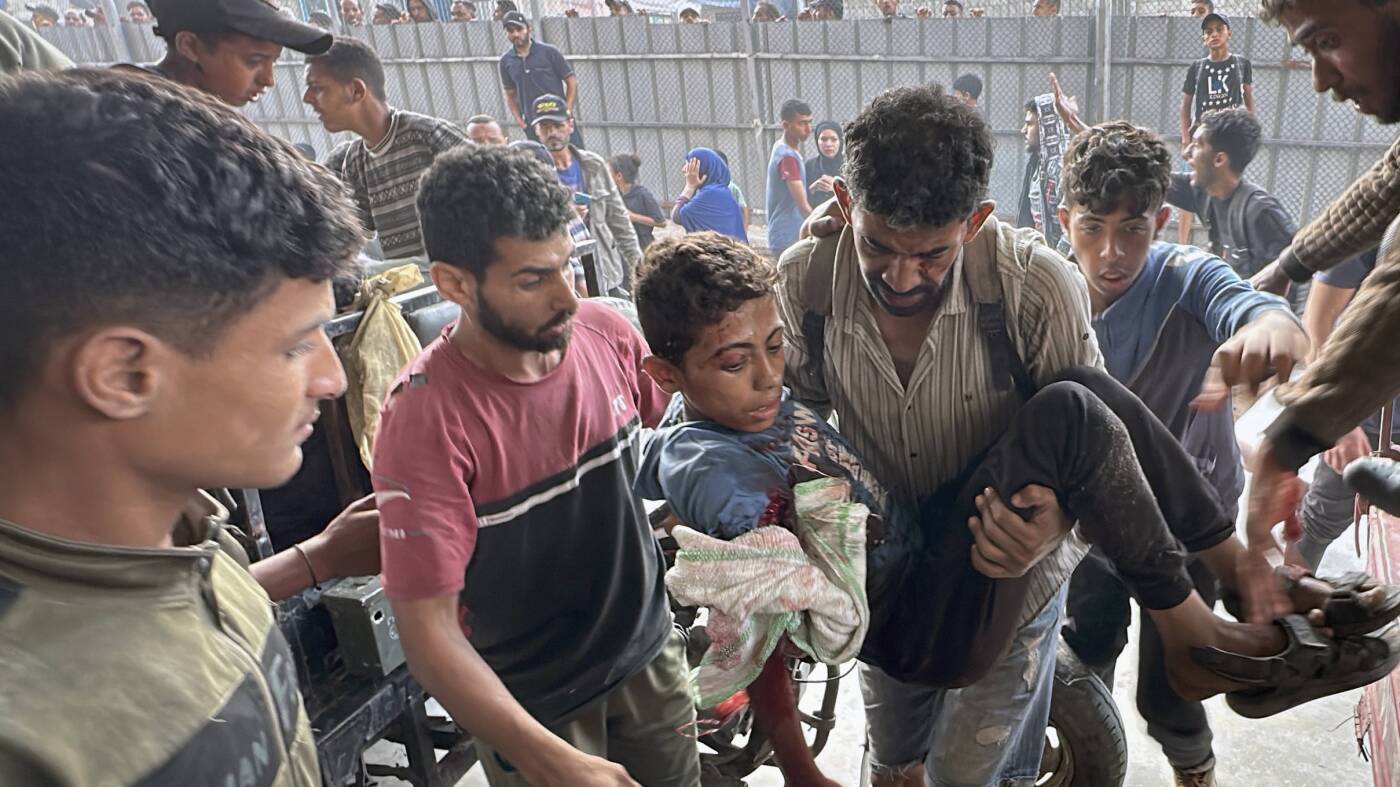A Convergence of Crises: Gaza’s Mounting Toll Amidst Shifting Israeli Focus
The situation in Gaza is rapidly deteriorating, marked by a spiraling death toll, a burgeoning famine, and a complex geopolitical landscape as Israel increasingly directs its attention towards Iran. While the immediate threat of direct conflict with Iran has momentarily escalated, the humanitarian crisis unfolding in Gaza remains a deeply urgent and tragically escalating concern. Reports consistently highlight a catastrophic level of suffering, with half a million people now facing starvation and the entire territory teetering on the brink of famine. This report analyzes the current state of affairs, drawing from recent news coverage, and examines the interplay between Israel’s shifting strategic priorities and the worsening humanitarian disaster in Gaza.
The Scale of the Humanitarian Crisis
The most alarming aspect of the current situation is the widespread starvation gripping Gaza. Numerous reports, including one from dozens of independent hunger experts, confirm that half a million people are already experiencing starvation. This isn’t a future projection; it’s a present reality. The threat of famine looms over the entire territory, a grim prospect that signifies a complete breakdown of essential life support systems.
This food insecurity is compounded by a collapsing healthcare system. Hospitals are reportedly on the brink of total collapse, crippled by the ongoing blockade of medical supplies. The Health Ministry has issued urgent appeals, highlighting a critical decline in blood donations, further exacerbating the challenges in treating the wounded and sick. The sheer number of casualties is overwhelming the already strained medical infrastructure. Reports indicate that, in recent weeks, dozens have died from starvation-related causes, including children and the elderly.
Beyond starvation and lack of medical care, the civilian population faces immense trauma and displacement. The relentless bombardment and ground operations have created a landscape of destruction, forcing countless individuals to flee their homes and seek refuge in overcrowded shelters.
Escalating Violence and Civilian Casualties
While Israel’s focus has demonstrably shifted towards Iran following recent attacks, military operations within Gaza continue, contributing significantly to the escalating death toll. Tuesday was reported as the deadliest day in recent weeks for Palestinians attempting to reach food distribution sites. Multiple sources, including Gaza’s civil defense agency, report that Israeli forces killed over 50 aid seekers in Khan Younis, and separate reports indicate at least 20 people were killed while waiting for food aid. These incidents underscore the perilous conditions faced by civilians simply attempting to access essential resources.
The overall death toll in Gaza is staggering. Figures are rapidly approaching 20,000, dwarfing the casualties of previous conflicts and exceeding the death rate observed in Ukraine. The scale of death and destruction is immense, leaving a lasting scar on the region. The reports of civilian deaths around relief efforts suggest a pattern of violence that is disproportionately impacting the most vulnerable populations.
The Interplay of Geopolitical Strategy and Humanitarian Impact
Israel’s evolving strategic focus on Iran is undeniably impacting the situation in Gaza, though not necessarily through a reduction in military activity. While attention is diverted to potential escalation with Iran, Israeli troops remain deeply entrenched within Gaza, and operations continue to claim civilian lives. The U.S., while reaffirming its support for Israel’s right to self-defense, has increasingly expressed concern over the mounting civilian death toll and has urged Israel to scale back its offensive.
The attacks on Iran and the subsequent retaliations have created a volatile regional dynamic. This heightened tension risks further diverting international attention and resources away from the humanitarian crisis in Gaza. The focus on preventing a wider Middle East war, while crucial, cannot come at the expense of addressing the immediate needs of the Gazan population.
Furthermore, the conflict has sparked widespread criticism of Israel’s actions, with some accusing them of waging a “war on children” and even employing tactics amounting to extermination and acts of genocide, citing the deliberate deprivation of essential resources like water. These accusations, while highly charged, reflect the depth of concern surrounding the humanitarian consequences of the conflict.
The Blockade and Aid Obstruction
A critical factor exacerbating the crisis is the ongoing blockade of Gaza. This long-standing policy, intensified during the current conflict, severely restricts the flow of essential goods, including food, water, medicine, and fuel. Reports highlight the deliberate cutting off of water supplies and the obstruction of aid deliveries, rendering the situation even more dire. The blockade is not merely a consequence of the war; it is a pre-existing condition that has systematically undermined the resilience of the Gazan population.
The international community has repeatedly called for increased humanitarian access to Gaza, but these calls have largely gone unheeded. The obstacles to delivering aid are numerous, ranging from bureaucratic hurdles and security concerns to deliberate restrictions imposed by Israeli authorities. This obstruction of aid is a significant contributing factor to the widespread starvation and suffering.
A Future Hanging in the Balance
The convergence of escalating violence, a shifting Israeli focus, and a crippling humanitarian crisis paints a bleak picture for the future of Gaza. The immediate priority must be to alleviate the suffering of the civilian population. This requires a significant increase in humanitarian aid, a lifting of the blockade, and a commitment to protecting civilians.
However, addressing the immediate crisis is only the first step. A lasting solution requires a comprehensive political settlement that addresses the root causes of the conflict and ensures the long-term security and well-being of both Israelis and Palestinians. Without such a settlement, the cycle of violence and suffering will inevitably continue, and the humanitarian crisis in Gaza will remain a persistent and tragic reality. The current situation demands not only a cessation of hostilities but also a fundamental reassessment of the policies and practices that have contributed to this devastating outcome.


